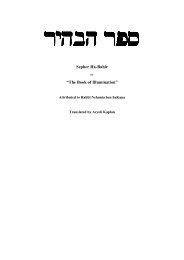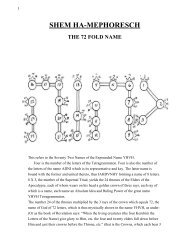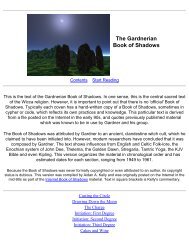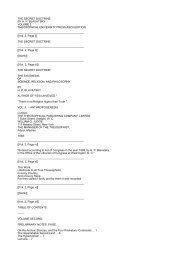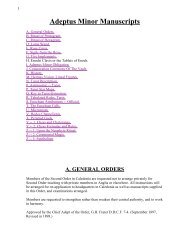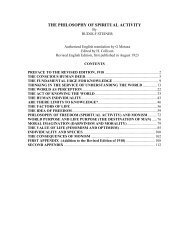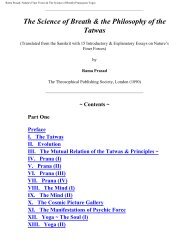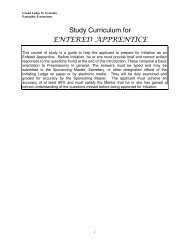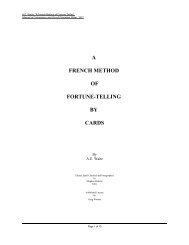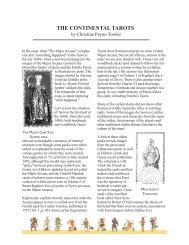You also want an ePaper? Increase the reach of your titles
YUMPU automatically turns print PDFs into web optimized ePapers that Google loves.
The Legend Of RA And Isis.<br />
created; He is <strong>the</strong> maker <strong>of</strong> his own form, and <strong>the</strong> fashioner <strong>of</strong> His own body--God Himself is existence,<br />
He endureth without increase or diminution, He multiplieth Himself millions <strong>of</strong> times, and He is<br />
manifold in forms and in members--God hath made <strong>the</strong> universe, and He hath created all that <strong>the</strong>rein is;<br />
He is <strong>the</strong> Creator <strong>of</strong> what is in this world, and <strong>of</strong> what was, <strong>of</strong> what is, and <strong>of</strong> what shall be. He is <strong>the</strong><br />
Creator <strong>of</strong> <strong>the</strong> heavens, and <strong>of</strong> <strong>the</strong> earth, and <strong>of</strong> <strong>the</strong> deep, and <strong>of</strong> <strong>the</strong> water, and <strong>of</strong> <strong>the</strong> mountains. God<br />
hath stretched out <strong>the</strong> heavens and founded <strong>the</strong> earth-What His heart conceived straightway came to pass,<br />
and when He hath spoken, it cometh to pass and endureth for ever--God is <strong>the</strong> fa<strong>the</strong>r <strong>of</strong> <strong>the</strong> gods; He<br />
fashioned men and formed <strong>the</strong> gods--God is merciful unto those who reverence Him, and He heareth him<br />
that calleth upon Him. God knoweth him that acknowledgeth Him, He rewardeth him that serveth Him,<br />
and He protecteth him that followeth Him.[1]<br />
Mono<strong>the</strong>ism and poly<strong>the</strong>ism coexistent.<br />
Because, however, poly<strong>the</strong>ism existed side by side with mono<strong>the</strong>ism in Egypt, M. Maspero believes that<br />
<strong>the</strong> words "God One" do not mean "One God" in our sense <strong>of</strong> <strong>the</strong> words; and Mr. Renouf thinks that <strong>the</strong><br />
"Egyptian nutar never became a proper name."[2] Whe<strong>the</strong>r poly<strong>the</strong>ism grew from mono<strong>the</strong>ism in Egypt,<br />
or mono<strong>the</strong>ism from poly<strong>the</strong>ism we will not venture to say, for <strong>the</strong> evidence <strong>of</strong> <strong>the</strong> pyramid texts shows<br />
that already in <strong>the</strong> Vth dynasty mono<strong>the</strong>ism and poly<strong>the</strong>ism were flourishing side by side. The opinion <strong>of</strong><br />
Tiele is that <strong>the</strong> religion <strong>of</strong> Egypt was from <strong>the</strong> beginning poly<strong>the</strong>istic, but that it developed in two<br />
opposite directions: in <strong>the</strong> one direction gods were multiplied by <strong>the</strong> addition <strong>of</strong> local gods, and in <strong>the</strong><br />
o<strong>the</strong>r <strong>the</strong> Egyptians drew nearer and nearer to mono<strong>the</strong>ism.[3]<br />
The sun <strong>the</strong> emblem <strong>of</strong> God.<br />
From a number <strong>of</strong> passages drawn from texts <strong>of</strong> all periods it is clear that <strong>the</strong> form in which God made<br />
himself manifest to man upon earth was <strong>the</strong> sun, which <strong>the</strong> Egyptians called Ra and that all o<strong>the</strong>r gods<br />
and goddesses were forms <strong>of</strong> him. The principal authorities for epi<strong>the</strong>ts applied to God and to His visible<br />
emblem <strong>the</strong> sun are <strong>the</strong> hymns and litanies which are found inscribed upon<br />
[1. Brugsch, Religion und Mythologie, pp. 96-99. The whole chapter on <strong>the</strong> ancient Egyptian conception <strong>of</strong> God should be<br />
read with M. Maspero's comments upon it in La Mythologie Égyptienne (Études de Mythologie, t. ii., p. 189 ff.).<br />
2. Hibbert Lectures, p. 99.<br />
3. Hypo<strong>the</strong>zen omtrent de wording van den Egyptischen Godsdienst (in Geschiedenis van den Godsdienst in de Oudheid,<br />
Amsterdam, 1893, p. 25); and see Lieblein, Egyptian Religion, Leipzig, 1884, p. 10.<br />
4 See <strong>the</strong> chapter "Dieu se manifestant par le soleil," in Pierret, Essai sur la Mythologie Égyptienne, pp. 18, 19.]<br />
{p. xciv}<br />
Confusion <strong>of</strong> gods.<br />
<strong>the</strong> walls <strong>of</strong> tombs,[1] stelæ, and papyri[2] <strong>of</strong> <strong>the</strong> XVIIIth dynasty; and <strong>the</strong>se prove that <strong>the</strong> Egyptians<br />
ascribed <strong>the</strong> attributes <strong>of</strong> <strong>the</strong> Creator to <strong>the</strong> creature. The religious ideas which we find in <strong>the</strong>se writings<br />
in <strong>the</strong> XVIIIth dynasty are, no doubt, <strong>the</strong> outcome <strong>of</strong> <strong>the</strong> religion <strong>of</strong> earlier times, for all <strong>the</strong> evidence<br />
now available shows that <strong>the</strong> Egyptians <strong>of</strong> <strong>the</strong> later periods invented comparatively little in <strong>the</strong> way <strong>of</strong><br />
religious literature. Where, how, and in what way <strong>the</strong>y succeeded in preserving <strong>the</strong>ir most ancient texts,<br />
are matters about which little, unfortunately, is known. In course <strong>of</strong> time we find that <strong>the</strong> attributes <strong>of</strong> a<br />
certain god in one period are applied to o<strong>the</strong>r gods in ano<strong>the</strong>r; a new god is formed by <strong>the</strong> fusion <strong>of</strong> two<br />
or more gods; local gods, through <strong>the</strong> favourable help <strong>of</strong> political circumstances, or <strong>the</strong> fortune <strong>of</strong> war,<br />
http://www.sacred-texts.com/egy/ebod/ebod07.htm (4 <strong>of</strong> 10) [8/10/2001 11:23:38 AM]




